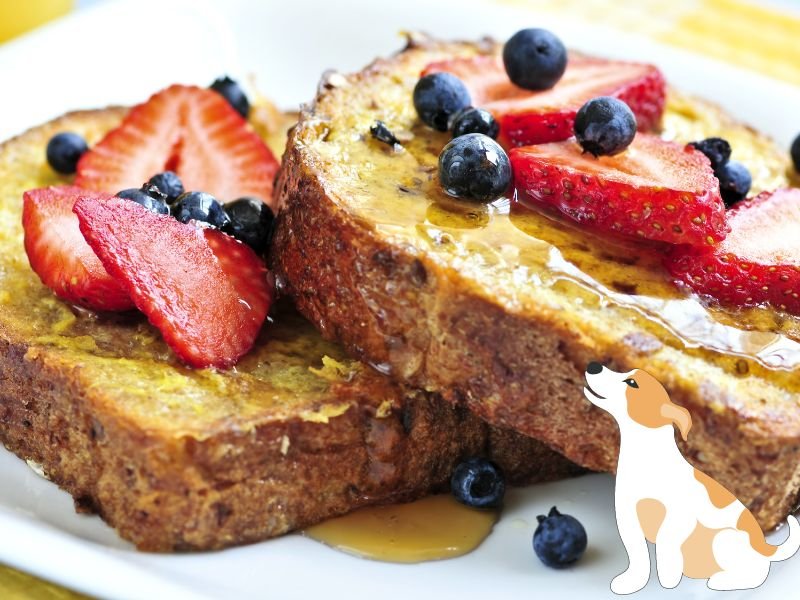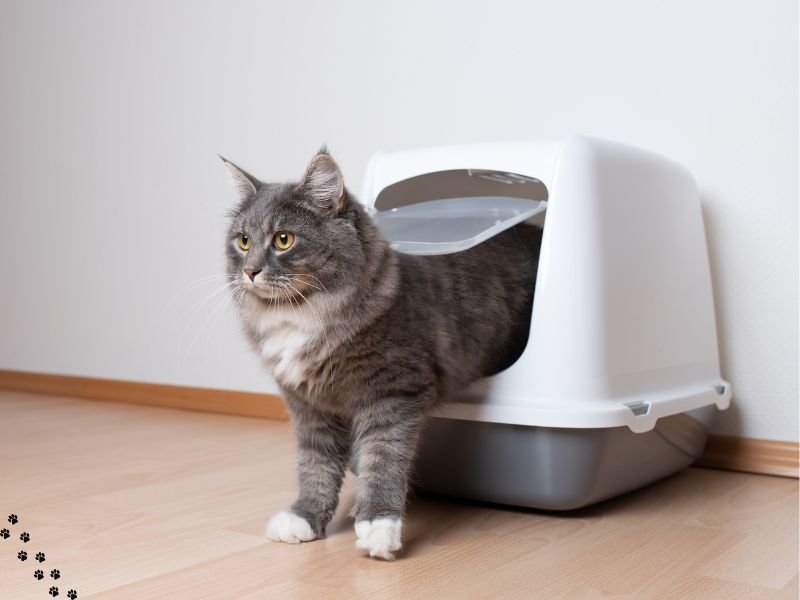Have you ever found yourself enjoying a delicious plate of French toast, only to be met with a pair of curious and eager eyes watching your every bite?
As dog owners, we often hesitate when it comes to sharing our breakfast delights with our furry friends, uncertain if certain human foods are safe for them to consume.
In the case of French toast, the answer might surprise you.
In this article, we will explore the question: Can dogs eat French toast?
Join us as we delve into the ingredients, toppings, and preparation methods to determine whether this classic breakfast treat can be a delightful indulgence or a potential health hazard for your canine companion.
Table of Contents
- The Potential Risks and Benefits of Feeding French Toast to Your Dog
- Understanding the Ingredients: Is French Toast Safe for Canine Consumption?
- Can Dogs Digest French Toast Properly? Exploring the Digestive System of Dogs
- Balancing Nutritional Needs: How French Toast Fits into a Dog’s Diet
- Preventing Harmful Reactions: Identifying Common Allergens in French Toast
- Safe Alternatives: Homemade French Toast Recipes for Your Furry Friend
- FAQs About Can Dogs Eat French Toast
- Conclusion
The Potential Risks and Benefits of Feeding French Toast to Your Dog
Feeding our furry friends table scraps can be a tempting way to spoil them, but it’s essential to consider the potential risks and benefits before offering them a taste of our human treats.
French toast, a delicious breakfast staple, may seem harmless, but can dogs safely consume it?
In this section, we will explore the advantages and disadvantages of feeding French toast to our canine companions.
Benefits
French toast contains several ingredients that can provide nutritional benefits to dogs.
Eggs, a primary component of French toast, are an excellent source of protein, which is essential for muscle development and repair.
Protein also aids in boosting the immune system, maintaining healthy skin and coat, and supporting overall growth.
Another ingredient commonly used in French toast is bread. While bread is not a necessary part of a dog’s diet, it can provide them with carbohydrates, which serve as an energy source.
However, it’s important to note that bread should only be consumed in moderation, as excess carbohydrates can lead to weight gain and other health issues.
Risks
Despite the potential benefits, there are some risks associated with feeding French toast to dogs. One significant concern is the use of sugar and syrup in the recipe.
Excessive sugar intake can lead to obesity, diabetes, dental problems, and even pancreatitis in dogs.
It’s crucial to avoid adding any sugary toppings to French toast when serving it to your canine companion.
Additionally, French toast often requires the use of milk or cream. While some dogs tolerate dairy products well, others may have lactose intolerance or allergies.
Consumption of milk products can result in digestive issues such as diarrhea, gas, or stomach upset.
If you choose to include milk or cream in your French toast recipe, monitor your dog for any adverse reactions.
To sum up, while French toast can provide some nutritional benefits to dogs, it’s crucial to consider the potential risks as well.
Weighing the advantages and disadvantages can help ensure the well-being of our furry friends.
Remember, moderation is key, and it’s always recommended to consult with a veterinarian before introducing new foods into your dog’s diet.
Stay tuned for the following sections, where we will further explore the ingredients, digestion, and alternative recipes concerning French toast for dogs.
Understanding the Ingredients: Is French Toast Safe for Canine Consumption?
French toast is a popular breakfast dish enjoyed by many around the world.
It typically consists of bread soaked in a mixture of eggs, milk, and spices, and then fried or baked.
While this breakfast treat may be delicious for humans, it is important to consider whether it is safe for our canine companions to consume.
When it comes to feeding French toast to dogs, the key lies in understanding the individual ingredients used in its preparation.
Let’s take a closer look at some of the common ingredients found in French toast and whether they are safe for our furry friends:
1. Bread
The foundation of French toast and bread is generally safe for dogs to consume in moderation.
However, it is crucial to ensure that the bread doesn’t contain any harmful ingredients like raisins, garlic, or onions, which can be toxic to dogs.
Additionally, opt for whole-grain bread or varieties without added sugars or artificial additives.
2. Eggs
Eggs are not only a staple ingredient in French toast, but they are also an excellent source of protein for dogs.
In fact, many commercial dog foods include eggs in their recipes. However, if your dog has any known allergies or sensitivities to eggs, it is best to consult with your veterinarian before incorporating French toast into their diet.
3. Milk
Milk is another main component of French toast, often adding richness and moisture to the dish.
While some dogs can tolerate small amounts of milk, it’s important to note that many adult dogs are lactose intolerant.
If your dog experiences digestive issues or diarrhea after consuming milk, it may be best to skip the dairy component of French toast altogether.
4. Spices
Common spices used in French toast include cinnamon, nutmeg, and vanilla extract.
These spices, when used in moderation and in small quantities, are generally safe for dogs.
However, certain spices like nutmeg can be toxic in large amounts, so it’s essential to use them sparingly.
It is always crucial to double-check the ingredients used in your French toast recipe and ensure they are safe for canine consumption.
Additionally, it is recommended to avoid adding any additional sweeteners like syrup or powdered sugar as they may contain artificial additives or excessive amounts of sugar, which can be harmful to dogs.
Remember, moderation is key when introducing any new food to your dog’s diet.
While French toast can be a tempting treat, it should be offered in small portions and as an occasional treat rather than a regular part of their diet.
Can Dogs Digest French Toast Properly? Exploring the Digestive System of Dogs
In this section, we will delve into the digestive system of dogs to understand whether they can properly digest French toast.
It is important to take into consideration their unique physiology and digestive processes to determine if French toast is a suitable addition to their diet.
The Digestive Process in Dogs
The digestive system of dogs is designed to break down and absorb nutrients from a diet primarily consisting of meat.
Their system starts with the mouth, where food is chewed and mixed with saliva before being swallowed.
From there, the food travels down the esophagus and enters the stomach, which produces digestive acids to further break down the food.
Proteins are broken down into amino acids, fats into fatty acids, and carbohydrates into sugars. This is where enzymes are released to aid in digestion.
Next, the partially digested food, also known as chyme, moves into the small intestine, where further digestion takes place.
Nutrients are absorbed into the bloodstream through the intestinal wall, while waste continues to travel through the large intestine and ultimately exits the body as stool.
Can Dogs Digest French Toast?
French toast, typically made from bread, eggs, milk, and spices, contains ingredients that are not typically part of a dog’s natural diet.
The bread itself can be difficult for dogs to digest, especially if it contains additives or grains that are not well-tolerated in their digestive system.
Additionally, eggs and milk, although generally safe for dogs, can cause digestive issues in some individuals.
While some dogs may be able to tolerate French toast to some extent, it is essential to consider the potential side effects it may have on their digestion. Dogs may experience symptoms such as upset stomach, diarrhea, or vomiting if French toast is not well tolerated or if they consume it in excessive amounts.
Furthermore, the high sugar content in French toast can lead to weight gain, dental issues, and even diabetes if fed in large quantities or frequently.
Consulting with a veterinarian is advisable before introducing French toast or any new food to your dog’s diet, especially if they have existing digestive issues, food allergies, or sensitivities.
Balancing Nutritional Needs: How French Toast Fits into a Dog’s Diet
French toast is a delicious and popular breakfast treat enjoyed by many humans.
However, when it comes to sharing our food with our furry friends, it is essential to consider their nutritional needs.
Firstly, it is important to note that French toast should be considered a treat rather than a staple food in a dog’s diet.
While it can offer some nutritional value, it should only be given in moderation. The primary components of French toast are bread, eggs, milk, and sometimes sugar and spices.
Bread, one of the main ingredients, is not harmful to dogs in small amounts.
However, it is crucial to ensure that the bread used for French toast is plain and free from any potentially harmful additives or artificial sweeteners that can be toxic to dogs.
Whole wheat bread can be a slightly healthier option as it contains more fiber than white bread.
Eggs, another key ingredient of French toast, are beneficial for dogs as they are an excellent source of protein.
Protein is crucial for the growth and repair of tissues in a dog’s body.
However, it is important to note that eggs should always be cooked thoroughly before giving them to your dog, as raw eggs can carry the risk of Salmonella or other bacterial infections.
Milk, commonly used in the batter to soak the bread, can be problematic for some dogs.
Many adult dogs are lactose intolerant and may experience digestive upset, such as diarrhea or vomiting if they consume milk or other dairy products.
If your dog shows signs of lactose intolerance, it is wise to avoid including milk in their French toast.
Lastly, the sugar and spices often added to French toast should be avoided or used sparingly. Sugar can lead to weight gain, tooth decay, and even the development of diabetes in dogs.
Additionally, certain spices, such as cinnamon or nutmeg, can irritate a dog’s gastrointestinal system or cause allergic reactions.
In conclusion, while French toast can be a tasty treat for your dog on occasion, it should not make up a significant portion of their diet.
It is crucial to use simple and natural ingredients when preparing French toast for your furry friend.
Always consult with your veterinarian before introducing any new food to your dog’s diet, especially if they have any medical conditions or dietary restrictions.
Preventing Harmful Reactions: Identifying Common Allergens in French Toast
In this section, we will explore the possible allergens present in French toast that could cause harm to your furry friend.
While French toast may seem harmless to us, it’s important to be aware that certain ingredients commonly found in this breakfast treat can pose a risk to dogs.
By identifying these potential allergens, you’ll be better equipped to prevent any harmful reactions in your beloved pet.
1. Wheat
One of the main ingredients in French toast is bread, which is typically made from wheat flour.
Wheat is a common allergen for dogs, and it can cause digestive issues, skin irritations, or even trigger an allergic reaction in some cases.
If your dog has a known wheat allergy, it is best to avoid feeding them French toast altogether.
2. Dairy
French toast often includes milk or cream in the egg mixture, which can be problematic for dogs that are lactose intolerant or have dairy allergies.
Consuming dairy products can lead to gastrointestinal upset, including diarrhea, gas, or vomiting.
If your dog experiences any of these symptoms after consuming French toast, it may be due to a dairy allergy.
3. Cinnamon and Nutmeg
While these spices are popular additions to French toast, they can potentially cause problems for dogs.
Cinnamon and nutmeg contain certain compounds that are toxic to canines in large amounts. Ingesting these spices can irritate your dog’s digestive system, leading to vomiting, diarrhea, or even neurological issues.
To ensure the safety of your dog, it’s essential to watch out for these common allergens if you choose to share French toast with them.
It is always recommended to consult with your veterinarian before introducing any new food into your dog’s diet, especially if they have known allergies or sensitivities.
Remember, prevention is key when it comes to protecting your pet’s health and well-being.
Also Check: Can Dogs Eat Gouda Cheese? Discover the Surprising Truth
Safe Alternatives: Homemade French Toast Recipes for Your Furry Friend
In this section, we will explore some safe and healthy alternatives to traditional French toast that you can prepare at home for your beloved dog.
While French toast can be potentially harmful to dogs due to its ingredients and cooking methods, these homemade recipes will ensure your furry friend can still enjoy a tasty treat without any risks.
Banana French Toast Bites
Bananas are a safe and nutritious option for dogs, and this recipe combines them with a dog-friendly twist on French toast.
Start by cutting a ripe banana into small pieces and mashing it in a bowl. In another bowl, whisk an egg and dip small slices of whole wheat bread in it.
Place the banana mixture on one slice, cover with another slice, and press gently. Cook the sandwich on a non-stick skillet until both sides are golden brown.
Cut into bite-sized pieces and serve it as a delicious and safe treat for your pup!
Peanut Butter French Toast Sticks
Peanut butter is a favorite among many dogs, and this recipe pairs it with a dog-friendly version of French toast.
Toast a slice of whole wheat bread until slightly crispy. Spread a thin layer of natural, unsalted peanut butter on one side of the toast and cut it into long sticks.
Beat an egg in a shallow dish and dip each stick in the egg mixture, coating it evenly. Cook the sticks on a non-stick skillet until both sides are golden brown.
Let them cool before serving it to your furry friend, who will surely love the combination of peanut butter and French toast!
Remember, these homemade recipes are designed as safe alternatives to traditional French toast for your dog.
However, it is important to consider any dietary restrictions or specific health conditions your dog may have. Always consult with your veterinarian before introducing any new foods into your dog’s diet.
Making your own dog-friendly French toast treats allows you to have control over the ingredients and ensures the utmost safety for your furry friend.
So, next time you crave French toast for breakfast, consider whipping up one of these tasty and safe alternatives for your dog to enjoy alongside you!
FAQs About Can Dogs Eat French Toast
Is French toast safe for dogs?
French toast can be safe for dogs as long as it is plain and does not contain any harmful ingredients like chocolate, raisins, or excessive sugar. However, it should only be given as an occasional treat and in moderation.
Can dogs eat French toast with syrup?
It is not recommended to feed dogs French toast with syrup as the sweeteners and artificial ingredients in syrup can potentially be harmful to them. Plain French toast without syrups or toppings is a safer option.
What ingredients should be avoided when making French toast for dogs?
When making French toast for dogs, it is important to avoid ingredients like chocolate, raisins, excessive sugar, cinnamon, nutmeg, and xylitol. These ingredients can be toxic or harmful to dogs.
Can French toast cause any digestive issues in dogs?
French toast, especially if made with fatty ingredients like butter, can cause digestive issues in dogs. It may lead to upset stomach, diarrhea, or pancreatitis. It is best to provide plain and simple French toast without any added fats or spices.
Are there any health benefits of feeding French toast to dogs?
There are no specific health benefits of feeding French toast to dogs. It may provide some occasional enjoyment to your furry friend, but a balanced and nutritious diet specifically formulated for dogs is always the best choice.
Conclusion
While dogs can eat plain French toast made with safe ingredients in moderation, it is important to be cautious and avoid any harmful or toxic ingredients.
French toast should not be a regular part of a dog’s diet, and it is always recommended to consult with a veterinarian before introducing any new human foods to your pet.













